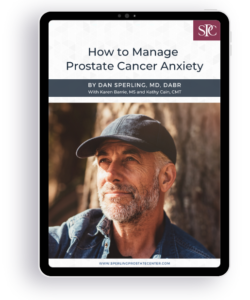“Your biopsy came back positive for prostate cancer.” If you hear these words, you wouldn’t be human if your stress level didn’t immediately rise. It’s a natural fight-or-flight response to news that comes as a shock—as in a diagnosis of prostate cancer (PCa).
The initial surge of biochemicals is a complex inflammatory process that gives the body immediate superpowers. The cardiorespiratory rate rises, the digestive rate slows down, muscles tense, sweat increases, and the mind races. This activity soon diminishes as reasoning takes over, but it lurks in the background in a different form. As one article puts it, “Stress tends to be short term and in response to a recognizable threat. Anxiety may linger and not have an easily identifiable trigger.”[i] Anxiety waits in the background, ready to pounce. Following a PCa diagnosis, it re-emerges over things like further diagnostic tests, exploring treatment options, choosing a treatment and going through it. Even when all these things are over, anxious thoughts and ideas may pop in time and again—and each time, the body churns up the same biochemical reaction.
Stress and Longevity
Today, scientists are more interested than ever in longevity, or living longer. Obviously, if you hope to live out the full extent of your life, it’s better to never get prostate cancer (PCa)—or any cancer—to begin with. This gets into the broad area of men’s health and prevention. Our blog posts cover many health and lifestyle choices that have been shown to reduce the risk of PCa, minimize the chances for aggressive PCa, and maximize quality of life with incurable PCa. Examples include posts on topics like diet/nutrition, supplements, and exercise.
Science now recognizes two types of stress, acute (intense, short-term) and chronic (low-grade, long-term). Both are fight-or-flight responses accompanied by temporary inflammatory biochemistry needed throughout human history for physical survival in moments of danger. Nowadays, even when there’s no actual threat to life, our body churns out the same reaction. For example, being late for an important job interview releases the same inflammatory stress response as if you were facing a tiger about to spring. In turn, inflammation in the body is a PCa precursor, and can shorten your life in other ways.
No doubt a PCa diagnosis causes acute stress, but daily life is full of threats over which we feel we have no control, causing a state of chronic stress. Leading business executive Ravi Venkatesan says we live in a VUCA world (Volatile, Uncertain, Complex, Ambiguous):
Economic growth is sluggish in most places. Every country is flailing around trying to discover a new social-economic-political order. The impact of climate change, and environmental degradation are frightening. Robotics and software automation are beginning to gobble up existing jobs.
Here’s a delightful story about managing stress and long life: On July 25, 2024 Elizabeth Francis turned 115 years old, becoming the oldest person in the U.S. Ms. Francis, a resident of Houston TX, attributes this milestone to certain lifestyle factors including her ability to cope with stress. A medical news story reports, “She has lived through both world wars, and survived the 1918 influenza outbreak and the COVID-19 pandemic. Most recently, she was affected by Hurricane Beryl, which struck just west of Houston on July 8, hitting her house.” The story goes on to point out that instead of being rattled, “she has been known to meet each chapter in her life with optimism, humor, strength and wisdom.” This is undoubtedly stress management at its finest. These traits counter and calm the biological stress response, a perfect example of mind merging with matter.
In fact, Ms. Francis’ entire lifestyle embodies the same principles we post in our blogs: “never smoking, no excessive alcohol consumption, no opioid use disorder, regular consistent physical activity, restorative sleep, and a predominantly plant-based eating pattern with little [processed foods].” She is also blessed with loving family, friends and a faith community to surround and companion her.
Returning to a diagnosis of PCa, and the subsequent steps each patient will face, it’s part of our mission at the Sperling Prostate Center to help patients manage the stress and anxiety that accompanies their journey. In addition to contributing our excellent clinical services of MRI-guided PCa detection, diagnosis and treatment to each patient’s longevity, we want to support their emotional well-being. We believe this is a double investment in their long life and high quality of life on all levels. We hope you will download our free e-book How to Manage Prostate Cancer Anxiety to learn specific ways to prevent acute and chronic stress from robbing you of your fullest life. Here’s to your longevity!
Download Our Free Ebook: “How to Manage Prostate Cancer Anxiety”

Don’t let anxiety over prostate cancer run you. Instead, learn how you can take charge and empower yourself to manage stress and boost positive treatment outcomes with our “first aid kit” of practical tips and tools.
NOTE: This content is solely for purposes of information and does not substitute for diagnostic or medical advice. Talk to your doctor if you are experiencing pelvic pain, or have any other health concerns or questions of a personal medical nature.
References
[i] Medical News Today, “Stress vs. anxiety: how to tell the difference.” Apr. 24, 2020. https://www.medicalnewstoday.com/articles/stress-vs-anxiety


